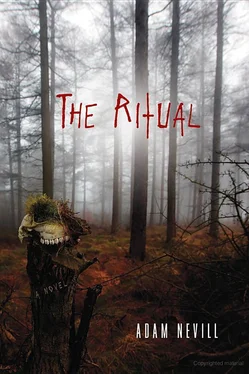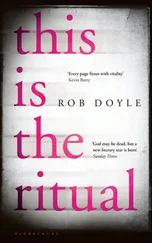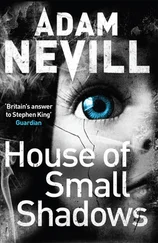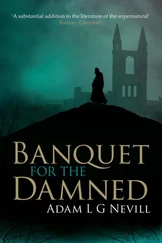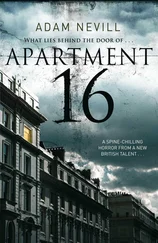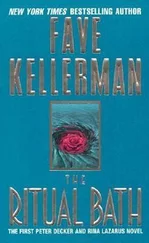Slowly, in first gear, he nudged the truck back onto the track and further into the shadows, into the greater darkness where daylight had no place and never had done. Driving fast was out of the question; this was second-gear driving all the way through. But it had not broken inside the vehicle. Could not. Maybe. He told himself he could tentatively wheel his way out of here, like a nervous motorist with a flat tyre in a safari park.
Minutes passed. How many he could not possibly know. But as each wheel turned one full rotation and he rolled forward and further along this hairline crack in the surface of the greatest forest of Europe, he promised himself that he would get out, and that this terrible black tunnel would end and that what stalked him through it could not possibly break into his shell of metal and …
He eased around a tight curve in first gear, and his one working headlight showed him a long stretch of narrow and straight track ahead. And the light also flashed upon what coiled and tensed down there on such long limbs.
Something tall and lean but shaggy about its haunches, was risen and poised; with bony arms, long as a stallion’s forelegs, hanging before it. And the great shape of its head was raised as if to catch a scent or sound on the breeze. It was waiting. Waiting for him.
The terrible head-shape was so long, ragged. It pulled itself back into a centre of gravity, anchored in thighs springloaded to strike. A glimmer of headlight flashed across corneas amber-red.
He thought it was an impossibly tall man. For a moment. Or an ape, a large scrawny one, poised to pounce like a great cat. But then of it, and about it, as it lowered down upon great muscled haunches, and before it fled right at him, were the briefest features of other things that made Luke suffocate on a tongue he was sure he had swallowed in his terror.
A thick-haired face, black, with a wet bovine muzzle, made itself temporarily available for scrutiny. The almost human eyes filled his mind. Eyes curiously sentient. Eyes revealing a hideous intent. To merely see them made him whimper. But in the visible moments of its swift charge it seemed mostly goatish, that shape of a head upon the bullock neck; though the yellow teeth should have been in the mouth of something else, long extinct. And extending from all of this, were the greatest of horns, from another place altogether. And it was coming at him. And he was going at it.
The engine screamed at the end of first gear, for he had no presence of mind to go up to second. And he screamed over the engine, so loudly, until blood came up and into his mouth, and his vision blurred.
Then it was through the windscreen.
Poles of aged bone ploughed into the webbing glass. The steering wheel snapped in half. The top of a skull, broad as a small table, followed through. Glass cubes covered Luke like sugar crystals. He heard a sound like the puncturing of some giant ball, and on either side of his neck the horns kept on going and going through the rear of the seat and the sheet metal of the cabin behind his shoulders. Until his nostrils and teeth and eyes were pressed into oily bristles that tasted like old meat and shat-upon straw. Something snapped like plastic between his eyes. His already broken nose.
Billows of steamed-out breath, cankerous with dead shoals of fish and sulphurous with a pig’s dung, infused the cabin, the world. And he was sick into it, onto it, that great matted skull. Just before it began the terrible thrashing of its head.
Luke was stuck fast into his seat. But the vehicle rocked like it had been T-boned at a junction by a speeding bus. Then two wheels were off the ground at the front. The rear wall of the cabin caved in and there was the grinding of great stones as those horns moved deeper into the steel of the cabin. The roof suddenly groaned like an old floor and then buckled like a paper bag. It was stuck; it was tearing the world apart to get out.
Against his stomach and groin, he felt a nose; as wet as seafood and contracting like a baby’s heart in his navel. It was the worst sensation of all, in there, in the darkness, while smashed into his seat. Below the nose its mouth worried and busied and dripped. It was seeking something to pinch and tear like tracing paper between quick fingers.
A last moment of himself, an instinct, or maybe it was a spasm, a twitch, sent from the origins of his own species when they coughed out their last under rutting horns and snatching jaws, came to his right hand. The hand that held the Swiss Army knife.
His right arm had been hammered against a horn as the thing smashed itself through the windscreen. But he could bend that arm at the elbow, and he could grit his teeth, then part his jaws, and scream too. And he screamed out his last as he pressed his tiny blade into that great black throat.
A bellow from a mouth filling with liquid deafened him. He fell forward in his seat to the sound of two sword blades clashing.
And it was gone from his face, his chest, the cabin, from the bonnet. Wet damp air came in through the shattered windscreen to temper the abattoir stink all about him.
Silence.
And then coughing, out there, in the dark wet forever of trees. Coughing as if to clear a throat of a fine bone. Luke looked at his right hand; it was empty.
The engine had stalled. There was no steering wheel.
He closed his eyes. Then opened them. His mouth was wet. Blood. His nose was smashed.
He pushed the rifle out and onto the bonnet. Then followed it with his own naked body.
He never heard it cough again, or bark, or yip like a black-muzzled jackal. But he was not alone in those woods that arched over him, cut out the weak greyish sunlight, and dripped heavy fragrant raindrops onto him like the branches and limbs of the trees were the ceiling of a limestone cave, glittery, timeless, and dreadful.
No, he never heard it or saw it again. But other things kept pace with him.
He swallowed and swallowed to ease the terrible thirst in a throat scorched by cordite. He would be cold, then hot and sweaty; he saw things and heard the voices of people that were not there; he passed in and out of worlds. He walked. And he walked.
Out of sight, the white people scurried. They chattered like little monkeys. They leapt up at the corner of his heavy eyes; they were small and pale like naked children.
Twice in his delirium, he turned and knelt and fired the rifle into the trees at where he thought he had seen something small and pallid land on tiny feet and begin chittering. And then there would be silence. An awful silence loaded with anticipation and vague hopes. Before it began again: the prancing of little feet on the wet forest floor just out of sight, and the crying out of small mouths in the distant undergrowth.
She had quite a brood; so many young. Moder was hurt and her young were angry. If he fell and passed out with exhaustion, he knew they would take him from his own dreams and from the wet mud his feet slid about in. So he walked and he walked and he talked to himself to keep them from taking him.
It must have been early evening when he came to the end of the track and saw the sky in what felt like the first time in years. The track simply ended and when he turned and looked back at the great wall of trees, it was like he stood in a coastal cove, peninsulas on either side, and had passed out of a crack in the cliff face, or a well-hidden cave. He could no longer see the end of the track he had just walked for the best part of a day and evening, nor any break in the thickets of undergrowth, rising tangled to the height of a man.
He had come on to a rocky plane, windswept and misty with rain. Grey, moss green, and whitish stone, forever. Besides a scattering of small birch trees it was arid, desolate like the bottom of some great ocean that had been drained.
Читать дальше
